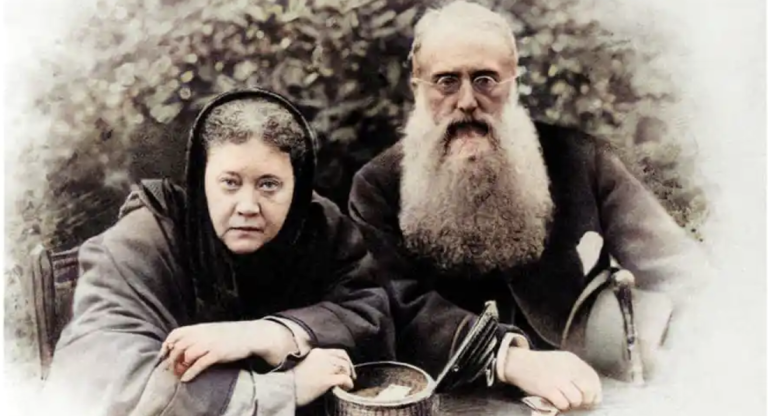
Henry Steel Olcott’s Fight Against Colonialism Celebrated with New Jersey Statue Unveiling, Bridging U.S. and Sri Lankan History
By Dr. Wije Kottahachchi, edited by Jim Luce.

When Colonel Henry Steel Olcott landed by ship in the southern coastal town of Galle in the British colonized island of Ceylon (now known as Sri Lanka) on May 17th 1880, the natives of that island were cocooned in their own culture and religious practices. The British colonial system had changed much of the population’s two thousand year old religious and educational system and brought it under the aegis of the British Crown.
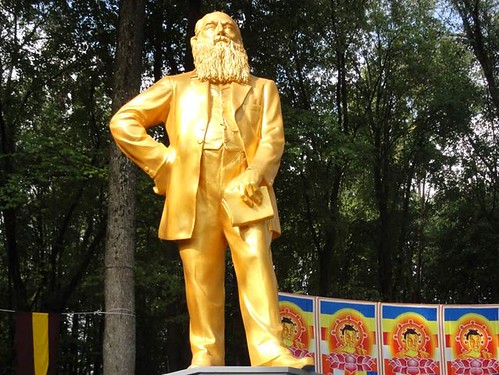
Two millenniums earlier Buddhism, in its’ purist form, had been brought to the island by sacred Buddhist monks from India, and at the time of Olcott’s arrival, had been relegated to four meager temple schools.
British assisted Christian schools were over 800 in number.
Colonel Henry Steel Olcott, left the shores of the United States in 1878 looking for Buddhism and oriental wisdom and ended up devoting the last three decades of his life to its revival.
A publication by the United States Information Service (USIS) in Colombo in the mid 1970’s notes:
The last years of the 19th century saw a remarkable American come to Sri Lanka, a man who came not to convert but to learn; the dedicated Colonel Henry Steel Olcott.
Col. Olcott is remembered with love and gratitude by the
Buddhists of Sri Lanka, since he reawakened the nation
and inspired them to struggle for their legitimate rights.
By petitioning the British authorities in London, he regained Wesak (Buddha’s birthday) as a legal holiday and guaranteed the registration of Buddhist Weddings under the colonial administration.
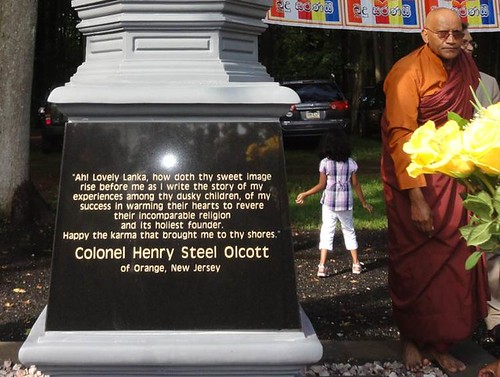
He founded schools, laid the foundation for a national system of education and paved the way for the national movement which succeeded in its’ struggle for independence more than half a century later. The schools that Olcott founded taught the nation’s children to value their civilization and culture.
As a mark of gratitude a life size statue of the former savior of a nation, military officer, journalist, lawyer, member of the commission to investigate the President Lincoln Assassination.
He was co-founder and first President of the Theosophical Society of New York will be unveiled at the serene and sprawling grounds of the New Jersey Buddhist Temple, in Princeton, N.J., on September 10th at 3pm.
The statue is a gesture and a tribute from the Alumni from the ‘Olcott Schools’ of Sri Lanka, a group of more than 400 schools that originated from the Buddhist education revival movement championed by Colonel Henry Steel Olcott, and Mr. Tilak Ranaviraja and family, former Deputy Ambassador to the Sri Lankan Embassy in Washington D.C.
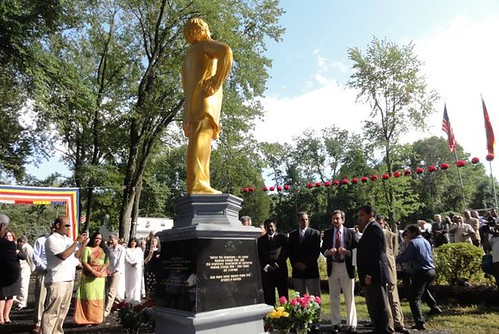
Photo: Kevin Jayawardena.
According to Dr. Wije Kottahachchi, President of the Ananda College Alumni Group in the U.S. (an Olcott School), and Chairman of the Organizing Committee,
“This is a symbol of appreciation of a great American who was responsible for uplifting the culture & heritage of Sri Lanka from the yoke of British colonialism.”
Colonel Olcott was born in Orange, New Jersey on August 2, 1832, the oldest of the six children of businessman Henry Wyckoff Olcott and Emily Steel Olcott.
Having completed his secondary schooling in New Jersey he attended the College of the City of New York and then Columbia University.
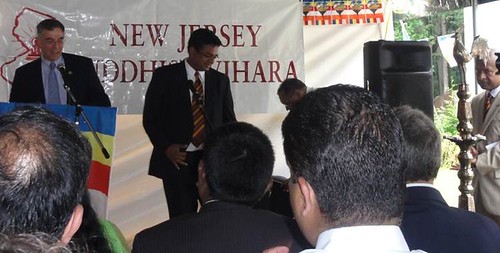
Olcott served in the U.S. Army during the Civil War under General Burnside.
He was later appointed by Secretary of State Stanton, as Special Commissioner to uncover corruption in Navy Yards and Military Depots in New York.
He was later promoted to the rank of Colonel and transferred to the Navy Department in Washington, D.C.
When President Abraham Lincoln was assassinated, Olcott was appointed to the investigating commission.

Later he studied law and after admission to the Bar in New York, practiced it for a few years.
In early 1870s Olcott became interested in the Spiritualist movement. In 1875, Olcott and Ms. Helena Blavatsky, with several others formed the Theosophical Society in New York City.
In December 1878 he left New York to India. There Olcott established and bolstered movements of the native cultures and religions to fight the repressive effects of the British colonial rule.
Olcott arrival in Sri Lanka (then Ceylon) in 1880, and would also help local organizational efforts with typical “Yankee impatience and efficiency.”
One of the most impressive aspects of the Olcott’s work in Sri Lanka is the continued success of the movements he created.
Colonel Olcott died in Adyar, India on February 17, 1907.
Around his body was wrapped the flag of the United States and
the Buddhist flag he had created for Buddhism around the world.
The statue unveiled was created by a Sri Lankan sculptor and is based on the Olcott statue in the busiest street named after Henry Steel Olcott in Colombo, Sri Lanka.
On the day of the unveiling of the statue, an exhibition of photographs related to Colonel Olcott’s service and the screening of a short biographical film took place.
The New Jersey Buddhist Temple is located at 4299 Route 27 in Princeton, N.J.
Dr. Wije Kottahachchi is president of the ACOBA-EC (Ananda College Old Boy’s Association East Coast USA).
Union Army Colonel Who Changed Course of Sri Lankan Culture (May 17, 2025; published originally in Daily Kos, Sept. 14, 2011 – edited by Jim Luce).
#ColonelOlcott #BuddhistRevival #CulturalHeritage #SriLankanHistory #CivilWarHero
TAGS: Henry Steel Olcott, Sri Lankan Buddhism, British colonialism, Theosophical Society,
Ananda College, cultural preservation, statue unveiling, New Jersey Buddhist Temple

Social Media Blurbs
X (Twitter):
Union Army Colonel Revives Sri Lankan Buddhism & Education Legacy. Discover Olcott’s impact on cultural preservation. #ColonelOlcott #History 🗽🇱🇰 bit.ly/olcott-story

Bluesky:
Meet Henry Steel Olcott—Civil War hero turned Buddhist revivalist. His schools transformed Sri Lanka’s identity. A new NJ statue honors his legacy. #CulturalHeritage bit.ly/olcott-story
LinkedIn:
Colonel Henry Steel Olcott’s work in 19th-century Sri Lanka offers lessons in leadership and cultural resilience. By reviving Buddhism and founding schools, this Union Army veteran laid groundwork for national independence. Explore how his legacy, celebrated in New Jersey, bridges business and societal impact. #ColonelOlcott #Education #CulturalPreservation Full Link
Truth Social:
Honoring Colonel Henry Steel Olcott, the American who revived Sri Lanka’s Buddhism & schools. Statue unveiled in NJ. #History bit.ly/olcott-story
Mastodon:
This weekend, a statue of Colonel Henry Steel Olcott—a Civil War veteran and champion of Sri Lankan culture—was unveiled in New Jersey. Learn how his schools and activism countered British colonialism, fostering a movement that led to independence. Join the discussion on cross-cultural solidarity. #ColonelOlcott bit.ly/olcott-story
Instagram:
✨ A Civil War hero’s journey to revive Buddhism 🌏 Colonel Olcott’s legacy lives on in New Jersey. Swipe to explore his story.
#CulturalHeritage #BuddhistRevival #SriLanka #History
🔗 Bio link for full story
Facebook:
Did you know a Union Army colonel reshaped Sri Lanka’s cultural future? Henry Steel Olcott’s schools and activism revived Buddhism under British rule. A new statue in New Jersey honors his transcontinental legacy. Discover his story and its modern relevance. #ColonelOlcott #History Full Link
Reddit:
How did a U.S. Civil War colonel become a hero in Sri Lanka? Henry Steel Olcott revived Buddhism and education under British rule, inspiring independence. Could his strategies inform today’s cultural preservation efforts? #History bit.ly/olcott-story
New York, N.Y. – On September 10, 2023, a life-size statue of Colonel Henry Steel Olcott—a Civil War veteran, co-founder of the Theosophical Society, and unsung architect of Sri Lanka’s cultural revival—was unveiled at the New Jersey Buddhist Temple in Princeton. The event honored Olcott’s transformative role in resurrecting Buddhism and education in colonial Ceylon (modern-day Sri Lanka), countering British-imposed Christian hegemony.
From Civil War to Spiritual Quest
Born in Orange, New Jersey, in 1832, Henry Steel Olcott served under General Burnside during the U.S. Civil War, later investigating corruption as a Special Commissioner for the Navy. His career pivoted after joining the Spiritualist movement and co-founding the Theosophical Society with Helena Blavatsky in 1875. By 1878, Olcott sailed to India, determined to champion Eastern philosophies against colonial erasure.
Revival of Buddhism in Colonial Ceylon
Arriving in Galle, Ceylon, in 1880, Olcott found Buddhism diminished to four temple schools, overshadowed by 800 British-backed Christian institutions. He petitioned London to recognize Wesak (Buddha’s birthday) as a holiday and legitimized Buddhist weddings. His “Yankee efficiency” mobilized communities, establishing over 400 schools, including Ananda College, which became pillars of national identity.
Legacy in Education and National Identity
Olcott’s schools taught Sinhala and Buddhist values, fostering pride that later fueled Sri Lanka’s independence movement. “He reawakened a nation,” said Dr. Wije Kottahachchi, president of the Ananda College Alumni Group. The U.S. Information Service noted Olcott’s unique legacy: an American who sought not to convert, but to empower.
A Transcontinental Tribute in New Jersey
The Princeton statue, modeled after Colombo’s Olcott monument, was funded by Sri Lankan alumni and diplomat Tilak Ranaviraja. Attendees explored photographs and a film detailing Olcott’s life, wrapped in the U.S. and Buddhist flags at his 1907 death. The tribute underscores enduring U.S.-Sri Lanka ties and Olcott’s vision of cultural solidarity.